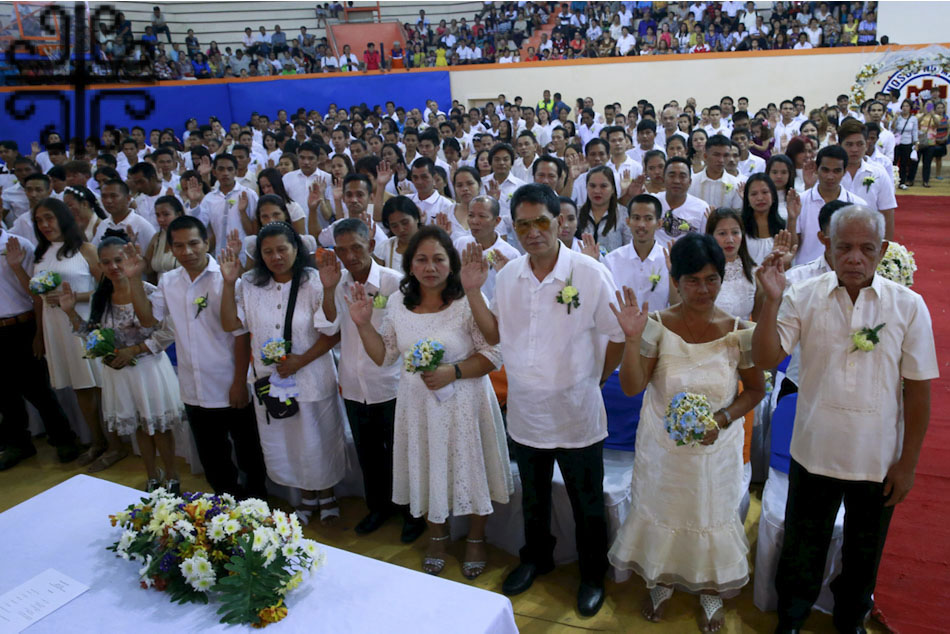Constitution 'doesn't allow' same-sex unions: SolGen | ABS-CBN
ADVERTISEMENT

Welcome, Kapamilya! We use cookies to improve your browsing experience. Continuing to use this site means you agree to our use of cookies. Tell me more!
Constitution 'doesn't allow' same-sex unions: SolGen
Constitution 'doesn't allow' same-sex unions: SolGen
Arianne Merez,
ABS-CBN News
Published Jun 26, 2018 04:02 PM PHT
MANILA - The 1987 Constitution limits marriage to a union between a man and a woman, Solicitor General Jose Calida told the Supreme Court Tuesday.
MANILA - The 1987 Constitution limits marriage to a union between a man and a woman, Solicitor General Jose Calida told the Supreme Court Tuesday.
Calida said this at the resumption of oral arguments on a petition seeking to allow same-sex marriage in the Philippines.
Calida said this at the resumption of oral arguments on a petition seeking to allow same-sex marriage in the Philippines.
The petition was filed in May 2015 by lawyer Jesus Nicardo Falcis III, who described himself in the pleading as "an open and self-identified homosexual.”
The petition was filed in May 2015 by lawyer Jesus Nicardo Falcis III, who described himself in the pleading as "an open and self-identified homosexual.”
His plea sought to declare as unconstitutional portions of the Family Code of the Philippines which "define and limit marriage as between man and woman."
His plea sought to declare as unconstitutional portions of the Family Code of the Philippines which "define and limit marriage as between man and woman."
ADVERTISEMENT
"Same-sex couples can live happily together but they cannot demand that the state recognize same-sex marriages because the Constitution doesn't allow such unions," Calida said in his opening statement.
"Same-sex couples can live happily together but they cannot demand that the state recognize same-sex marriages because the Constitution doesn't allow such unions," Calida said in his opening statement.
"Our traditions and history attest to this," he added.
"Our traditions and history attest to this," he added.
Calida's remarks were in response to the petitioner's claim that the State's charter does not provide any gender restrictions when it comes to marriage.
Calida's remarks were in response to the petitioner's claim that the State's charter does not provide any gender restrictions when it comes to marriage.
"There is absolutely no language in the 1987 Constitution or any of the previous constitutions that imposes a gender restriction in order for Filipinos to exercise their right to marry," lawyer Darwin Angeles, co-counsel of Falcis, had told the high court last week.
"There is absolutely no language in the 1987 Constitution or any of the previous constitutions that imposes a gender restriction in order for Filipinos to exercise their right to marry," lawyer Darwin Angeles, co-counsel of Falcis, had told the high court last week.
Contrary to Angeles' claims, the government's top lawyer explained that it was the intention of the framers of the charter to define and limit marriage as a union between a man and a woman.
Contrary to Angeles' claims, the government's top lawyer explained that it was the intention of the framers of the charter to define and limit marriage as a union between a man and a woman.
"It is a fundamental principle of constitutional construction that the intent of the framers should be given effect. Their intention could not be any clearer: marriage is the union between a man and a woman," Calida said.
"It is a fundamental principle of constitutional construction that the intent of the framers should be given effect. Their intention could not be any clearer: marriage is the union between a man and a woman," Calida said.
He explained that the state is not violating anyone's rights in imposing this limit on marital unions, arguing that the "ultimate goal" of any marriage is procreation through natural "sexual cooperation."
He explained that the state is not violating anyone's rights in imposing this limit on marital unions, arguing that the "ultimate goal" of any marriage is procreation through natural "sexual cooperation."
"The State’s limitation of the definition of marriage as a union between only a man and a woman under the Family Code is a valid exercise of police power," he said.
"The State’s limitation of the definition of marriage as a union between only a man and a woman under the Family Code is a valid exercise of police power," he said.
"The State then has the power to determine the marital unions it would recognize," he added.
"The State then has the power to determine the marital unions it would recognize," he added.
Historic oral arguments on Falcis' plea opened legal discussion of a taboo in Asia's bastion of Catholicism, where 80 percent of its 100 million people subscribe to the faith.
Historic oral arguments on Falcis' plea opened legal discussion of a taboo in Asia's bastion of Catholicism, where 80 percent of its 100 million people subscribe to the faith.
ADVERTISEMENT
ADVERTISEMENT



